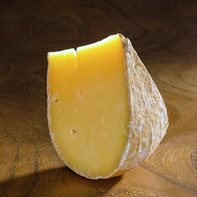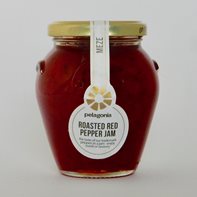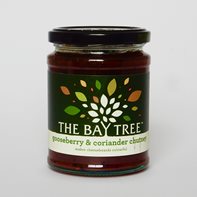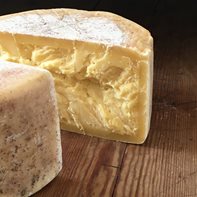
Extra Mature Wyfe Of Bath
Wyfe Of Bath comes from Park Farm - near Bath - where farmer Graham Padfield, son Hugh and team make a set of organic cheeses that started, back in the 90s, with the original 'Bath Soft Cheese' and its very close relative Kelston Park.
Wyfe of Bath took its name from Chaucer and its character from Gouda via Graham and his herd of Park Farm Frisians. A succulent, nutty, creamy cheese - its taste just says buttercups and summer meadows. Now, though, they're maturing it on from the original ten weeks to one year plus. It has a big taste that just glows and we highly recommend it!
Pasteurised, vegetarian.
Bath Soft Cheese
We tend to think of the brie/camembert style of cheese as intrinsically French, but actually cheeses of this type were once made in many parts of this country. Technically these are known as 'mould-ripened' cheese, from the downy white coat of penicillium candidum mould which effectively ripens the cheese from the outside in. Our domestic examples never became nationally known because transport and storage issues restricted them to a small local area. Then, as time went on farmhouse cheesemaking declined generally, and the memory of these cheeses disappeared.
Fast forward to the early 90s and farmer Graham Padfield, from Kelston, near Bath, is looking to start cheesemaking. Cheddar is the obvious choice, but he knows better than to try and compete with master cheddar-makers like the Keens or the Montgomerys, just down the road. So what to make?
The answer came in a visit to the local library, where he found an account of a long-lost Bath cheese ("when the curds have drained, sprinkle salt on and spread with a feather ... when a fine white mould has covered them they are fit to eat"). The reference to white mould, and to the spreadable nature of the ripe cheese, suggested a local 'brie', so Graham's path was set.
But it was a long, frustrating path. Cheesemaking is not just a matter of finding a recipe, following the instructions and - hey presto - wonderful cheese. There
are so many variables, so many slightly different ways of carrying out each stage in the process, and every slight change affects the result - for better or worse. Perseverance is a key skill for the aspiring cheesemaker, and fortunately this is something Graham had, because finally - after many twists and turns - his Bath Soft Cheese fulfilled it's potential. I can't do better than quote Sarah Freeman in The Real Cheese Companion: “Bath Soft is gloriously rich, flowing, and creamy, with a widely mixed bouquet of sweet flowery flavours, sometimes cooler, sometimes warmer and more vibrant, depending on the season". There's also a round version: Kelston Park.
The flip side of a cheese type - cheddar, brie - being popular, however, is that there's a lot competition. So in due course Graham started to look for other cheeses he could make with his milk, which, since 2002, was certified organic. First came Bath Blue, made elsewhere but matured by Graham at Kelston, but to complete the family he felt a hard cheese was needed, and in due course Wyfe of Bath appeared. Name from Chaucer, character from Gouda via Graham and his herd of Park Farm Frisians. A succulent, nutty, creamy cheese - it's taste says buttercups and summer meadows, and I see it's just won "Best Organic Hard Cheese" for the 2nd year running at the Bath & West Show. The characteristic shape comes form the way it's made - in cloth-lined colanders.















